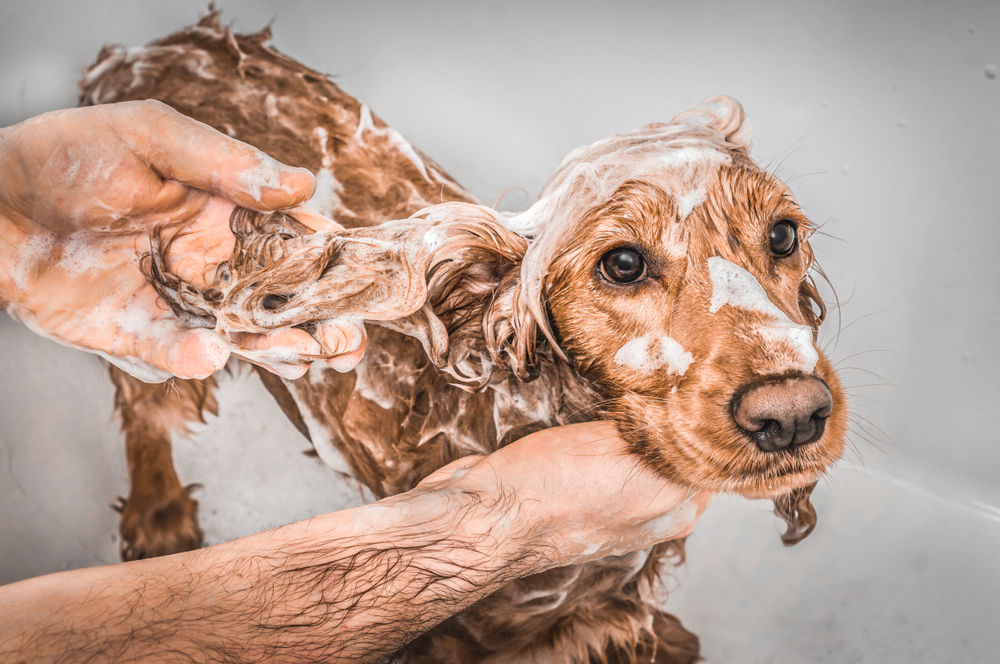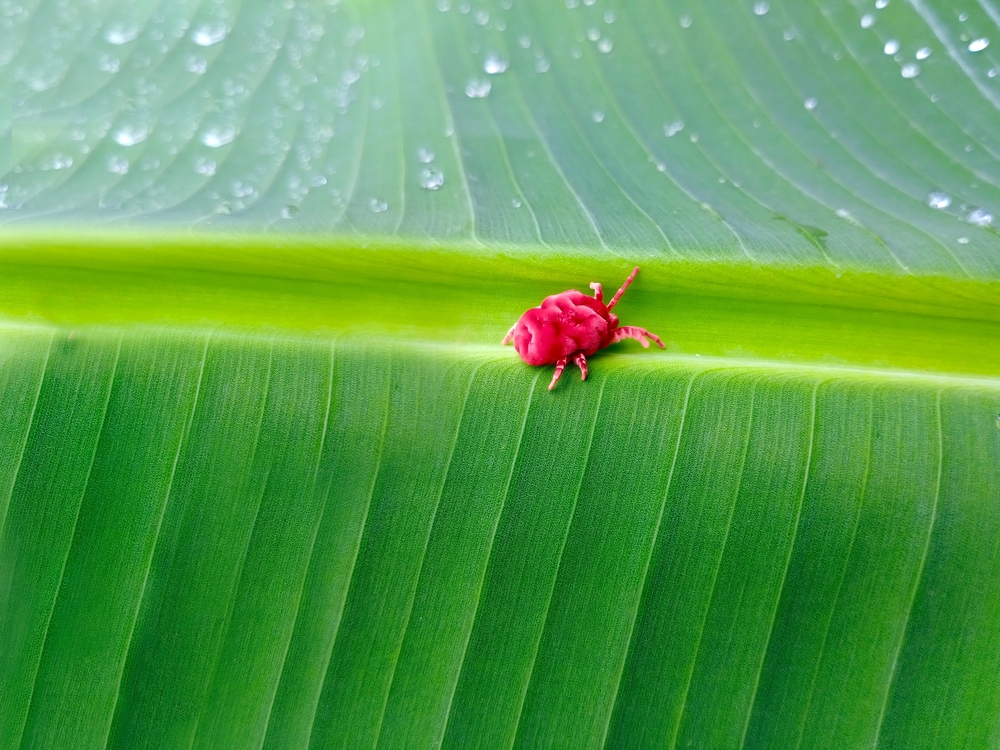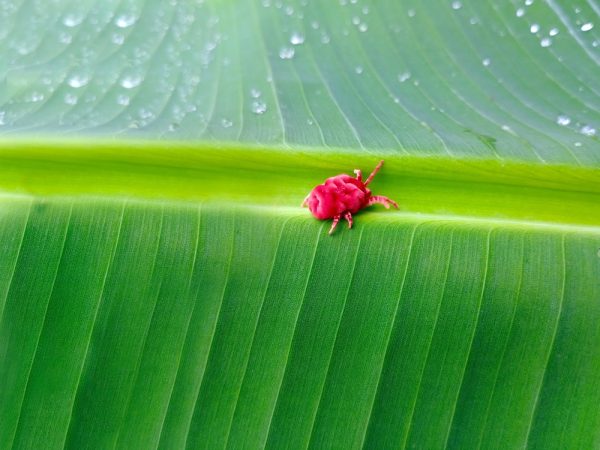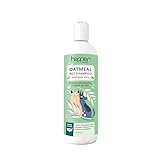Click to Skip Ahead
Chiggers are tiny mites that live near water and are typically found in grass or wooded areas. They enjoy the warmth, come out in the warmer months, and they attach to clothes. They are also known for biting people, causing itching around the bite site. Although many people believe they bury themselves in skin, they actually feed on skin cells and do not break the skin.
As well as being a potential pest for people, chiggers can also bite dogs and cause itching and discomfort. The itching can last a week or so, but your vet might be able to prescribe a drug to help combat the itching.
Read on for more information on chiggers and the effects of their bites on dogs, what you can do about them, and other common questions about chiggers on dogs.
What Are Chiggers?
Also known as harvest mites, red bugs, itch mites, and scrub mites, the proper name for chiggers is Trombiculamites. These microscopic mites are very difficult to spot, especially out in the open, and they are something of a pest because they attach to clothes.
They will also crawl on the skin and bite to eat skin cells, causing inflammation and itching around the site of the bites. The mites do not break the skin which means they are easily brushed off, but they tend to congregate, which means if you have one you likely have more.
As well as being a pest for people, chiggers will also attempt to bite dogs. If they manage to get under the coat and onto the skin, your dog could suffer the same itchiness and rashes.

Where and When They’re Found
Chiggers are usually found in grassy and wooded areas around water. They prefer warm conditions so they are most likely to be found in the summer months, and because they are so small and prevalent in certain areas of the US, they can be very difficult to avoid altogether.
If you like taking your dog out adventuring, whether you enjoy dock diving or long hikes, you will likely come into contact with this little creature.
Diagnosis of Chigger Bites
Harvest mites are tiny, and they don’t pierce the skin or burrow into the skin. Because they cause itching, your dog is likely to scratch or bite the affected area. They might cling to your dog’s coat, but the size of these little mites means they are very difficult to spot.
A vet will ask about any recent walks or adventures while trying to determine when the itching started. They will want to rule out any adverse reactions to other environmental factors, but if you have been walking in areas that are prone to chiggers, this is the likely cause.
Treatment Options
If you know your dog has come into contact with chiggers, you can take steps to remove them. Use an oatmeal shampoo and warm water and give your dog a good bath. This will help remove any mites that are still hanging on.
If you are looking for the perfect, pet-friendly shampoo and conditioner combo, we highly recommend the products by Hepper. With a soothing oatmeal shampoo, free of soaps and other harsh chemicals, and a cucumber and aloe scented conditioner, your pet's skin and coat will be smooth, hydrated, and irritation-free.
At Dogster, we’ve admired Hepper for many years, and decided to take a controlling ownership interest so that we could benefit from the outstanding products of this cool pet company!
The oatmeal shampoo will not only help get rid of the mites, but it will also start to soothe the skin before it gets too itchy. You can also try Epsom salts if the oatmeal shampoo doesn’t do the job.
If your vet diagnoses the problem as chigger bites, they may be able to suggest a medication that is designed specifically to kill mites. Alternatively, they may prescribe a steroid that suppresses the immune response to the bite and helps get rid of the itchy feelings.
Once the chiggers have been removed, itching will likely continue for between 1 and 2 weeks. You should keep an eye on the affected area to ensure that your dog isn’t causing open sores while scratching and gnawing. Open sores can become infected, especially if your dog continues to scratch or roll around.

How to Prevent Chigger Bites
It is very difficult to stop the scratching caused by chigger bites without steroids or other medical treatment. As such, prevention is better than cure. This means avoiding areas where you know chiggers can be found. If they are in your yard, you may need to clear out any tall grass and even consider using pesticides to get rid of them.
Prevent your dog from investigating the pesticides while they do their job or use one that is considered safe for households with pets. You should ask your vet about flea and tick preventatives that will also kill mites.
Frequently Asked Questions (FAQ)
How Do I Know If My Dog Has Chiggers?
The mite itself is very small, although usually visible if you look closely. If your dog has been scratching or biting at a specific part of the body, look for the mites. If you are struggling to see properly, use a magnifying glass or even your phone camera zoomed in.
If you have been somewhere that is prone to chiggers or that has ideal conditions for the mites to live in, this is also a good indication that your dog may have come into contact with them.

How Do You Get Rid of Chiggers on a Dog?
Start by brushing them and then give your dog a soapy, warm bath with plenty of water. The water and shampoo will help lift the chiggers off your dog’s skin and out of their coat before they are washed down the plughole. Phone your vet for advice about treatment for flea, tick, and mite prevention if you’re not already using one.
Luckily chiggers are self-limiting meaning once your dog picks them up they will only cause itching for a short time before dying or moving on. However, if your dog is picking up chiggers regularly they could cause recurrent problems.
Can Dogs Transfer Chiggers to Humans?
Chiggers do not transfer from dogs to people. If you are suffering chigger bites, it is most likely because you have walked through grass or other plants where the mites are living.

Can Chiggers Live on Bedding?
Chiggers cannot live in bedding. It is the young chiggers that latch onto people and pets and bite. When the young mature to nymphs and then to adults, they complete their lifecycle in soil where they lay eggs, before dying.
Do Chiggers Go Away on Their Own?
Chiggers are self-limiting so they will eventually go away on their own as long as your dog doesn’t get re-infected. However, before they go away their saliva in your dog’s skin will cause irritation and itching, which can last around a week or so.
Conclusion
Chiggers are also known as harvest mites and red mites. They are microscopic mites that are difficult to spot in the grass and undergrowth they typically live in, although they are visible in your dog’s coat or on their skin.
However, the first most people know about chiggers is when they see their dog itching and even biting at the area. This sensation is caused when the mite injects a fluid into skin cells to cause them to liquefy for easier consumption.
Although chigger bites are uncomfortable, they are not harmful unless the constant itching causes sores or open wounds, which can become infected if left untreated.
Featured Image Credit: Manoj 007, Shutterstock














